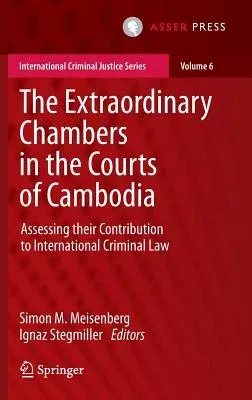The Extraordinary Chambers in the Courts of Cambodia: Assessing Their Contribution to International Criminal Law (2016)Hardcover - 2016, 7 April 2016

Qty
1
Turbo
Ships in 2 - 3 days
In Stock
Free Delivery
Cash on Delivery
15 Days
Free Returns
Secure Checkout

Part of Series
International Criminal Justice
Print Length
612 pages
Language
English
Publisher
T.M.C. Asser Press
Date Published
7 Apr 2016
ISBN-10
9462651043
ISBN-13
9789462651043
Description
Product Details
Book Edition:
2016
Book Format:
Hardcover
Country of Origin:
NL
Date Published:
7 April 2016
Dimensions:
23.39 x
15.6 x
3.51 cm
ISBN-10:
9462651043
ISBN-13:
9789462651043
Language:
English
Location:
The Hague
Pages:
612
Publisher:
Weight:
1052.33 gm